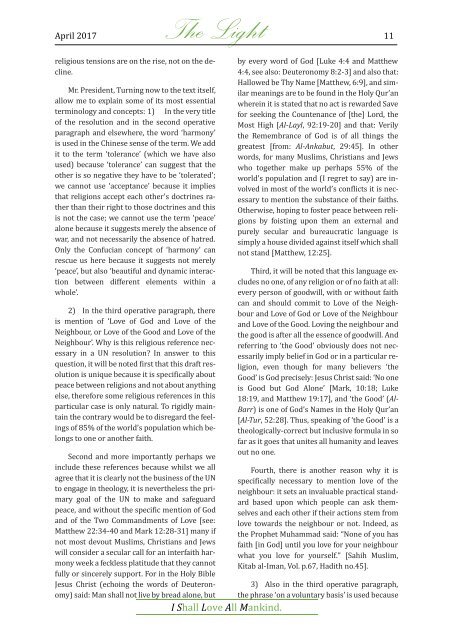2017 04 The Light April 2017
monthly Journal of the Ahmadiyya Association for the Propagation of Islam. Presenting Islam as a tolerant, liberal and peaceful religion as practiced by the Holy Prophet Muhammad (s).
monthly Journal of the Ahmadiyya Association for the Propagation of Islam. Presenting Islam as a tolerant, liberal and peaceful religion as practiced by the Holy Prophet Muhammad (s).
Create successful ePaper yourself
Turn your PDF publications into a flip-book with our unique Google optimized e-Paper software.
<strong>April</strong> <strong>2017</strong> <strong>The</strong><br />
<strong>Light</strong> 11<br />
religious tensions are on the rise, not on the decline.<br />
Mr. President, Turning now to the text itself,<br />
allow me to explain some of its most essential<br />
terminology and concepts: 1) In the very title<br />
of the resolution and in the second operative<br />
paragraph and elsewhere, the word ‘harmony’<br />
is used in the Chinese sense of the term. We add<br />
it to the term ‘tolerance’ (which we have also<br />
used) because ‘tolerance’ can suggest that the<br />
other is so negative they have to be ‘tolerated’;<br />
we cannot use ‘acceptance’ because it implies<br />
that religions accept each other’s doctrines rather<br />
than their right to those doctrines and this<br />
is not the case; we cannot use the term ‘peace’<br />
alone because it suggests merely the absence of<br />
war, and not necessarily the absence of hatred.<br />
Only the Confucian concept of ‘harmony’ can<br />
rescue us here because it suggests not merely<br />
‘peace’, but also ‘beautiful and dynamic interaction<br />
between different elements within a<br />
whole’.<br />
2) In the third operative paragraph, there<br />
is mention of ‘Love of God and Love of the<br />
Neighbour, or Love of the Good and Love of the<br />
Neighbour’. Why is this religious reference necessary<br />
in a UN resolution? In answer to this<br />
question, it will be noted first that this draft resolution<br />
is unique because it is specifically about<br />
peace between religions and not about anything<br />
else, therefore some religious references in this<br />
particular case is only natural. To rigidly maintain<br />
the contrary would be to disregard the feelings<br />
of 85% of the world’s population which belongs<br />
to one or another faith.<br />
Second and more importantly perhaps we<br />
include these references because whilst we all<br />
agree that it is clearly not the business of the UN<br />
to engage in theology, it is nevertheless the primary<br />
goal of the UN to make and safeguard<br />
peace, and without the specific mention of God<br />
and of the Two Commandments of Love [see:<br />
Matthew 22:34-40 and Mark 12:28-31] many if<br />
not most devout Muslims, Christians and Jews<br />
will consider a secular call for an interfaith harmony<br />
week a feckless platitude that they cannot<br />
fully or sincerely support. For in the Holy Bible<br />
Jesus Christ (echoing the words of Deuteronomy)<br />
said: Man shall not live by bread alone, but<br />
I Shall Love All Mankind.<br />
by every word of God [Luke 4:4 and Matthew<br />
4:4, see also: Deuteronomy 8:2-3] and also that:<br />
Hallowed be Thy Name [Matthew, 6:9], and similar<br />
meanings are to be found in the Holy Qur’an<br />
wherein it is stated that no act is rewarded Save<br />
for seeking the Countenance of [the] Lord, the<br />
Most High [Al-Layl, 92:19-20] and that: Verily<br />
the Remembrance of God is of all things the<br />
greatest [from: Al-Ankabut, 29:45]. In other<br />
words, for many Muslims, Christians and Jews<br />
who together make up perhaps 55% of the<br />
world’s population and (I regret to say) are involved<br />
in most of the world’s conflicts it is necessary<br />
to mention the substance of their faiths.<br />
Otherwise, hoping to foster peace between religions<br />
by foisting upon them an external and<br />
purely secular and bureaucratic language is<br />
simply a house divided against itself which shall<br />
not stand [Matthew, 12:25].<br />
Third, it will be noted that this language excludes<br />
no one, of any religion or of no faith at all:<br />
every person of goodwill, with or without faith<br />
can and should commit to Love of the Neighbour<br />
and Love of God or Love of the Neighbour<br />
and Love of the Good. Loving the neighbour and<br />
the good is after all the essence of goodwill. And<br />
referring to ‘the Good’ obviously does not necessarily<br />
imply belief in God or in a particular religion,<br />
even though for many believers ‘the<br />
Good’ is God precisely: Jesus Christ said: ‘No one<br />
is Good but God Alone’ [Mark, 10:18; Luke<br />
18:19, and Matthew 19:17], and ‘the Good’ (Al-<br />
Barr) is one of God’s Names in the Holy Qur’an<br />
[Al-Tur, 52:28]. Thus, speaking of ‘the Good’ is a<br />
theologically-correct but inclusive formula in so<br />
far as it goes that unites all humanity and leaves<br />
out no one.<br />
Fourth, there is another reason why it is<br />
specifically necessary to mention love of the<br />
neighbour: it sets an invaluable practical standard<br />
based upon which people can ask themselves<br />
and each other if their actions stem from<br />
love towards the neighbour or not. Indeed, as<br />
the Prophet Muhammad said: “None of you has<br />
faith [in God] until you love for your neighbour<br />
what you love for yourself.” [Sahih Muslim,<br />
Kitab al-Iman, Vol. p.67, Hadith no.45].<br />
3) Also in the third operative paragraph,<br />
the phrase ‘on a voluntary basis’ is used because














